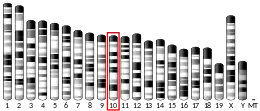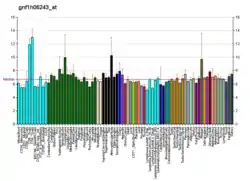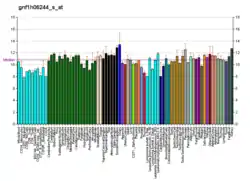NCOA7
Nuclear receptor coactivator 7 is a protein that in humans is encoded by the NCOA7 gene.[5][6]
See also
References
- GRCh38: Ensembl release 89: ENSG00000111912 - Ensembl, May 2017
- GRCm38: Ensembl release 89: ENSMUSG00000039697 - Ensembl, May 2017
- "Human PubMed Reference:". National Center for Biotechnology Information, U.S. National Library of Medicine.
- "Mouse PubMed Reference:". National Center for Biotechnology Information, U.S. National Library of Medicine.
- Shao W, Halachmi S, Brown M (Apr 2002). "ERAP140, a Conserved Tissue-Specific Nuclear Receptor Coactivator". Mol Cell Biol. 22 (10): 3358–72. doi:10.1128/MCB.22.10.3358-3372.2002. PMC 133794. PMID 11971969.
- "Entrez Gene: NCOA7 nuclear receptor coactivator 7".
Further reading
- Ohira M, Morohashi A, Nakamura Y, et al. (2003). "Neuroblastoma oligo-capping cDNA project: toward the understanding of the genesis and biology of neuroblastoma". Cancer Lett. 197 (1–2): 63–8. doi:10.1016/S0304-3835(03)00085-5. PMID 12880961.
- Halachmi S, Marden E, Martin G, et al. (1994). "Estrogen receptor-associated proteins: possible mediators of hormone-induced transcription". Science. 264 (5164): 1455–8. Bibcode:1994Sci...264.1455H. doi:10.1126/science.8197458. PMID 8197458.
- Nguyen TA, Hoivik D, Lee JE, Safe S (1999). "Interactions of nuclear receptor coactivator/corepressor proteins with the aryl hydrocarbon receptor complex". Arch. Biochem. Biophys. 367 (2): 250–7. doi:10.1006/abbi.1999.1282. PMID 10395741.
- Hartley JL, Temple GF, Brasch MA (2001). "DNA Cloning Using In Vitro Site-Specific Recombination". Genome Res. 10 (11): 1788–95. doi:10.1101/gr.143000. PMC 310948. PMID 11076863.
- Wiemann S, Weil B, Wellenreuther R, et al. (2001). "Toward a Catalog of Human Genes and Proteins: Sequencing and Analysis of 500 Novel Complete Protein Coding Human cDNAs". Genome Res. 11 (3): 422–35. doi:10.1101/gr.GR1547R. PMC 311072. PMID 11230166.
- Simpson JC, Wellenreuther R, Poustka A, et al. (2001). "Systematic subcellular localization of novel proteins identified by large-scale cDNA sequencing". EMBO Rep. 1 (3): 287–92. doi:10.1093/embo-reports/kvd058. PMC 1083732. PMID 11256614.
- Rushing SR, Denison MS (2002). "The silencing mediator of retinoic acid and thyroid hormone receptors can interact with the aryl hydrocarbon (Ah) receptor but fails to repress Ah receptor-dependent gene expression". Arch. Biochem. Biophys. 403 (2): 189–201. doi:10.1016/S0003-9861(02)00233-3. PMID 12139968.
- Strausberg RL, Feingold EA, Grouse LH, et al. (2003). "Generation and initial analysis of more than 15,000 full-length human and mouse cDNA sequences". Proc. Natl. Acad. Sci. U.S.A. 99 (26): 16899–903. Bibcode:2002PNAS...9916899M. doi:10.1073/pnas.242603899. PMC 139241. PMID 12477932.
- Mungall AJ, Palmer SA, Sims SK, et al. (2003). "The DNA sequence and analysis of human chromosome 6". Nature. 425 (6960): 805–11. Bibcode:2003Natur.425..805M. doi:10.1038/nature02055. PMID 14574404.
- Ota T, Suzuki Y, Nishikawa T, et al. (2004). "Complete sequencing and characterization of 21,243 full-length human cDNAs". Nat. Genet. 36 (1): 40–5. doi:10.1038/ng1285. PMID 14702039.
- Gerhard DS, Wagner L, Feingold EA, et al. (2004). "The Status, Quality, and Expansion of the NIH Full-Length cDNA Project: The Mammalian Gene Collection (MGC)". Genome Res. 14 (10B): 2121–7. doi:10.1101/gr.2596504. PMC 528928. PMID 15489334.
- Wiemann S, Arlt D, Huber W, et al. (2004). "From ORFeome to Biology: A Functional Genomics Pipeline". Genome Res. 14 (10B): 2136–44. doi:10.1101/gr.2576704. PMC 528930. PMID 15489336.
- Mehrle A, Rosenfelder H, Schupp I, et al. (2006). "The LIFEdb database in 2006". Nucleic Acids Res. 34 (Database issue): D415–8. doi:10.1093/nar/gkj139. PMC 1347501. PMID 16381901.
- Durand M, Kolpak A, Farrell T, et al. (2007). "The OXR domain defines a conserved family of eukaryotic oxidation resistance proteins". BMC Cell Biol. 8: 13. doi:10.1186/1471-2121-8-13. PMC 1847813. PMID 17391516.
External links
- NCOA7+protein,+human at the US National Library of Medicine Medical Subject Headings (MeSH)
This article incorporates text from the United States National Library of Medicine, which is in the public domain.
This article is issued from Wikipedia. The text is licensed under Creative Commons - Attribution - Sharealike. Additional terms may apply for the media files.






